(MENAFN- Asia Times) BANGKOK – When the Covid-19 pandemic first hit Thailand in the first half of 2020, forcing the government to impose lockdowns and travel bans that effectively killed the crucial tourism industry, many economists foresaw a contraction of 10% or more for the year.
But Thailand's gross domestic product (GDP) shrank just 6.1% in 2020, painful but not as bad as expected with the loss of the kingdom's US$60 billion tourism industry, which normally accounts for around 18% of GDP.
With exports also down 6.6% year-on-year with the decline in global demand, the better-than-expected GDP performance owes to the government's substantial social relief assistance program, among the most magnanimous and successful ones worldwide, according to the World Bank.
“The response was remarkable,” said Francesca Lamanna, World Bank senior economist and co-author of the report – Thailand Economic Monitor July 2021: The Road to Recovery – released last week.
“Thailand moved from being a modest poverty package transfer country to having one of the largest social assistance responses in the world. It was very successful in mitigating the increase in poverty,” she told a recent webinar.
In 2019, Thailand's social assistance packages to the poor amounted to a mere 0.8% of GDP, compared with 3.2% last year. Without the substantial relief measures, Thailand's poverty rate would have increased from 6.2% of the population in 2019 to 7.4% in 2020, the World Bank estimates.
Those measures also boosted consumption, providing many of Thailand's most vulnerable people with cash handouts to spend on food and other necessities.
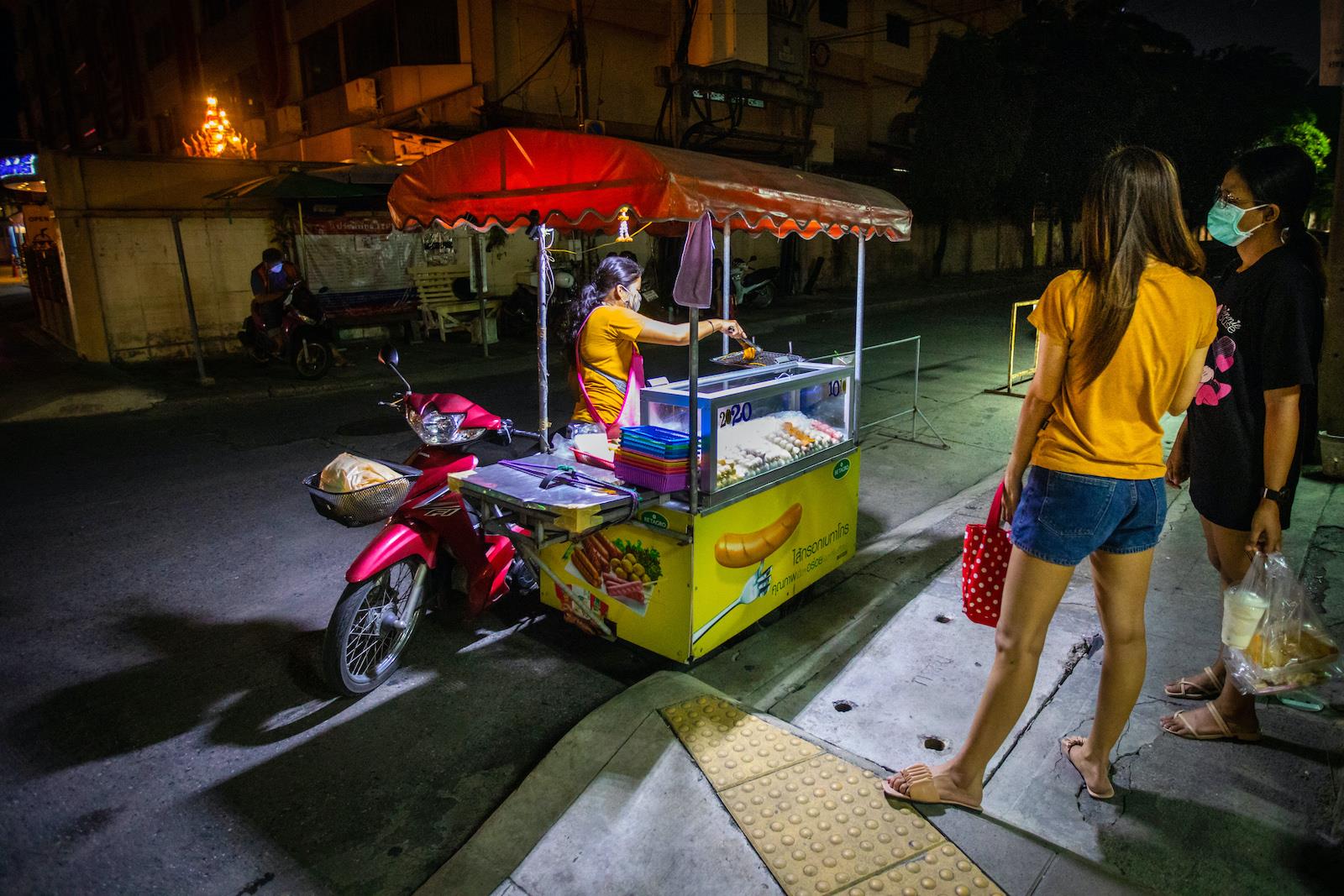
Customers wait for a street vendor to prepare their takeaway orders in Bangkok on July 19, 2021. Photo: AFP / Candida Ng
“Last year our social relief measures reached 40 million people and this was demonstrated in the contraction of 6.1% of GDP, which was much less than multiple projections including our own,” said Kulaya Tantitemit, director-general of the Thai Finance Ministry's Fiscal Policy Office.
The Covid relief measures were financed chiefly by 1 trillion baht ($30.5 billion) in borrowings that have lifted Thailand's public debt-to-GDP ratio from 41% in 2019 to 55% as of May 2021. That figure is likely to spike up to 62% next year.
This year, Thailand took out another 500 billion baht ($15.25 billion) in borrowings to finance the ongoing relief programs, made necessary by a worst-yet Covid wave that started in April has accelerated infections and deaths to record levels since.
As the kingdom gradually locks down to contain the spike, some are skeptical the government will be able to defy downcast projections two years in a row.
“While fiscal support is critical and helpful, the timing and pace of Thailand's economic recovery will depend on the progress made in vaccinating the population,” said Ndiame Diop, World Bank country director for Brunei, Malaysia, Philippines and Thailand.
World Bank directors tend to avoid commenting on sensitive political topics, but Diop had put his finger on the crux of Thailand's current challenge in combatting Covid's third phase.
While Thailand's well-established medical infrastructure was widely credited for successfully containing the first two, milder waves of Covid that started in March and December of last year, respectively, Prime Minister Prayut Chan-ocha's government has come under rising criticism for botching its vaccine rollout.
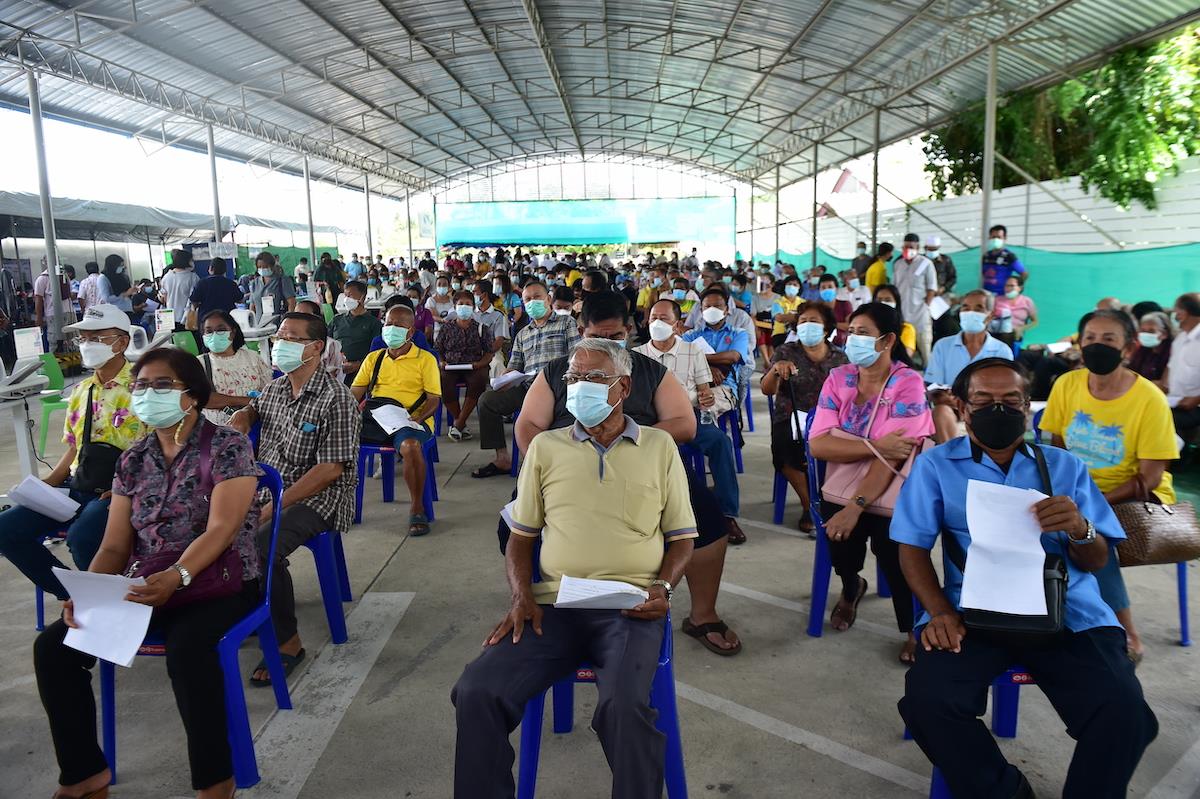
People wait to be administered doses of the AstraZeneca vaccine at the Narathiwat Hospital compound in the southern province of Narathiwat on June 7, 2021, as mass vaccination rollouts begin in Thailand. Photo: AFP / Madaree Tohlala
To date, some 14.2 million doses have been distributed, with only 3.44 million people receiving two doses, or 4.9% of the population, well below the worldwide average of 13%.
The government has said it plans to vaccinate 70% of the population by the end of 2021, but mishaps and delays mean that's unlikely.
In light of the virulence of Covid's third wave, spread mainly by the more contagious Delta strain, the World Bank last week downgraded its Thai GDP growth forecast from 3.4% (made in March) to 2.2% (made last week).
The Bank of Thailand (BOT) last month revised its estimate for GDP growth in 2021 from 3% previously, to 1.8% now. Thai exports have started to rebound, thanks to an uptick in demand in advanced economies such as the United States and European Union, but international tourism – and to a great extent domestic consumption – are still at the mercy of Covid-19.
Prayut has vowed to reopen the economy by October, but with the third wave surge of Covid cases and deaths, this, too, seems increasingly unlikely.
Thailand recently launched the“Phuket sandbox”, a pilot project for reopening the tourism sector to vaccinated tourists. If all goes to plan, the scheme would still only bring in an estimated 100,000 foreign tourists in the July-September period, and perhaps up to 3 million in the fourth quarter.
But that's still a smidgen compared with the 40 million-plus tourists who visited Thailand in 2019.
And as the Delta variant's worldwide spread signals the pandemic is far from over, it's not clear global mass tourism is returning anytime soon, particularly to a developing country that appears increasingly to have lost its grip on Covid-19.
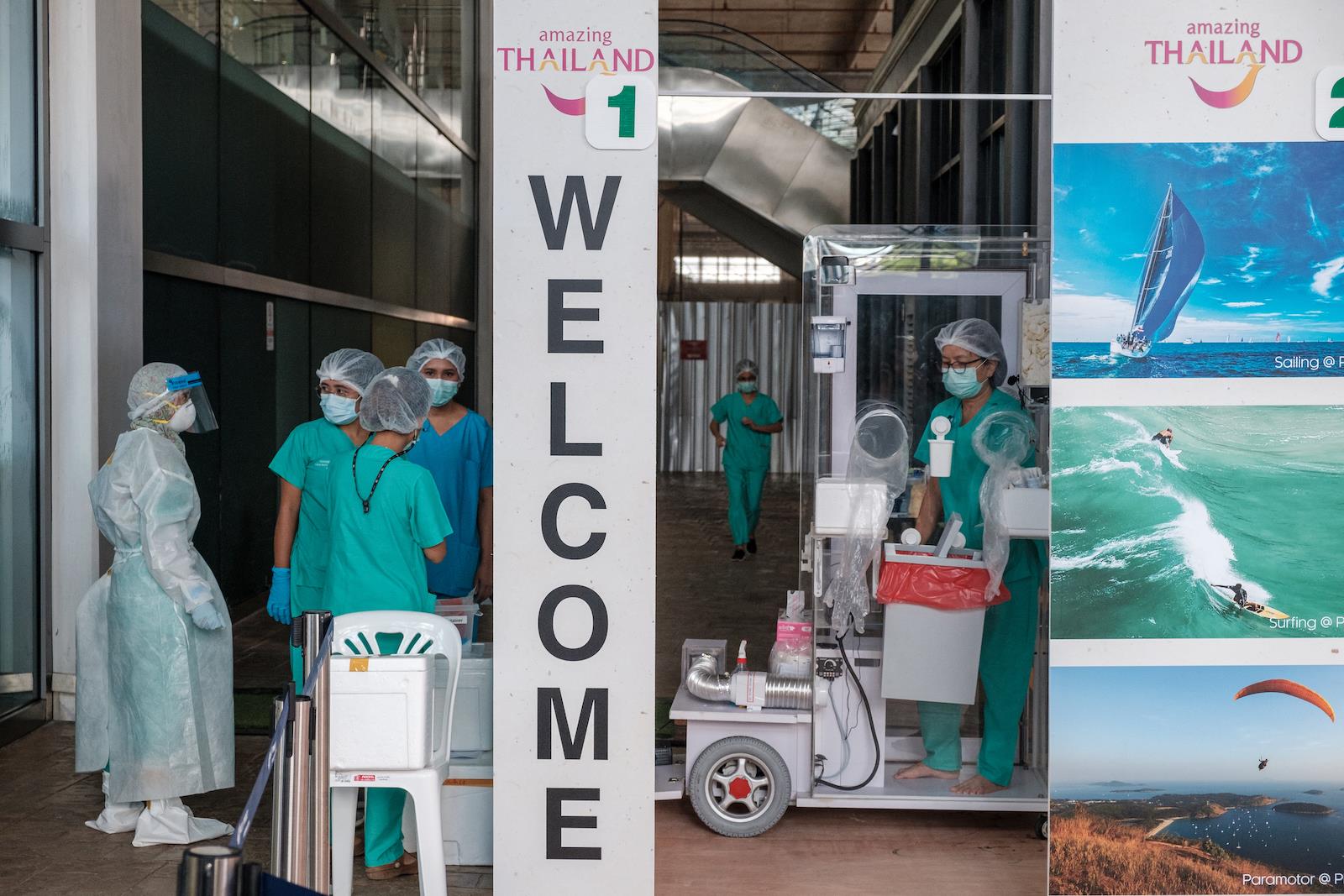
The first international tourists to enter Thailand arrive at Phuket International airport on July 1, 2021, under the“Phuket Sandbox” program. Photo : AFP via NurPhoto / Thomas De Cian
Whether Thailand will be able to ramp up GDP via new stimulus programs is also unclear. There is a broad acknowledgment among officials and economists that Thailand cannot continue to borrow itself out of the crisis as public debt breaches the government's self-set ceiling of 60% of GDP.
Parts of the new 500 billion baht borrowing, initially intended for stimulus programs to bolster economic recovery, have been diverted to more relief assistance in the form of cash handouts in Covid hotspots including Bangkok and particularly hard-hit sectors such as restaurants.
With fewer resources to draw on, the government will need to be more focused on who receives its largesse going forward, officials say.
“This is still a work in progress,” acknowledged the Finance Ministry's Kulaya.“It is hard for us to achieve our targeting goal given the fact that a large chunk of the Thai population are not formally registered, are not part of the database.
“In going forward with the relief measures, the challenge is how do we optimize the spending? How do we target the people who need the relief the most?”
The World Bank is urging authorities to speed up consolidation of its social registry to better understand who needs assistance, something that should have been done a long time ago, critics say.
In the first rounds of Covid-19 social assistance delivered last year, branded as“No One Left Behind”, many were indeed left in the lurch.
“In the 'No One Left Behind' scheme, in fact, about 4 million people fell through the cracks,” said Nipon Poapongsakorn, a distinguished fellow at the Thailand Development Research Institute (TDRI) think tank in Bangkok.“And out of that 4 million, a large number were in the informal sector.”
An estimated three million migrant workers (mostly from Myanmar) have also fallen through the cracks of social assistance programs, despite their brawny contributions to the Thai economy. These fringe populations have also been excluded from the vaccine rollout plans, such as they are.
“If you only vaccinate Thai people this is a potential timebomb,” Nipon warned.“Thai billionaires and millionaires have to start helping these communities big time, starting with job creation and engaging in negotiations for vaccine procurement.”
Thailand's billionaires, not known for their charitable inclinations, have been one of the few segments of Thai society to have prospered during and perhaps from the pandemic.
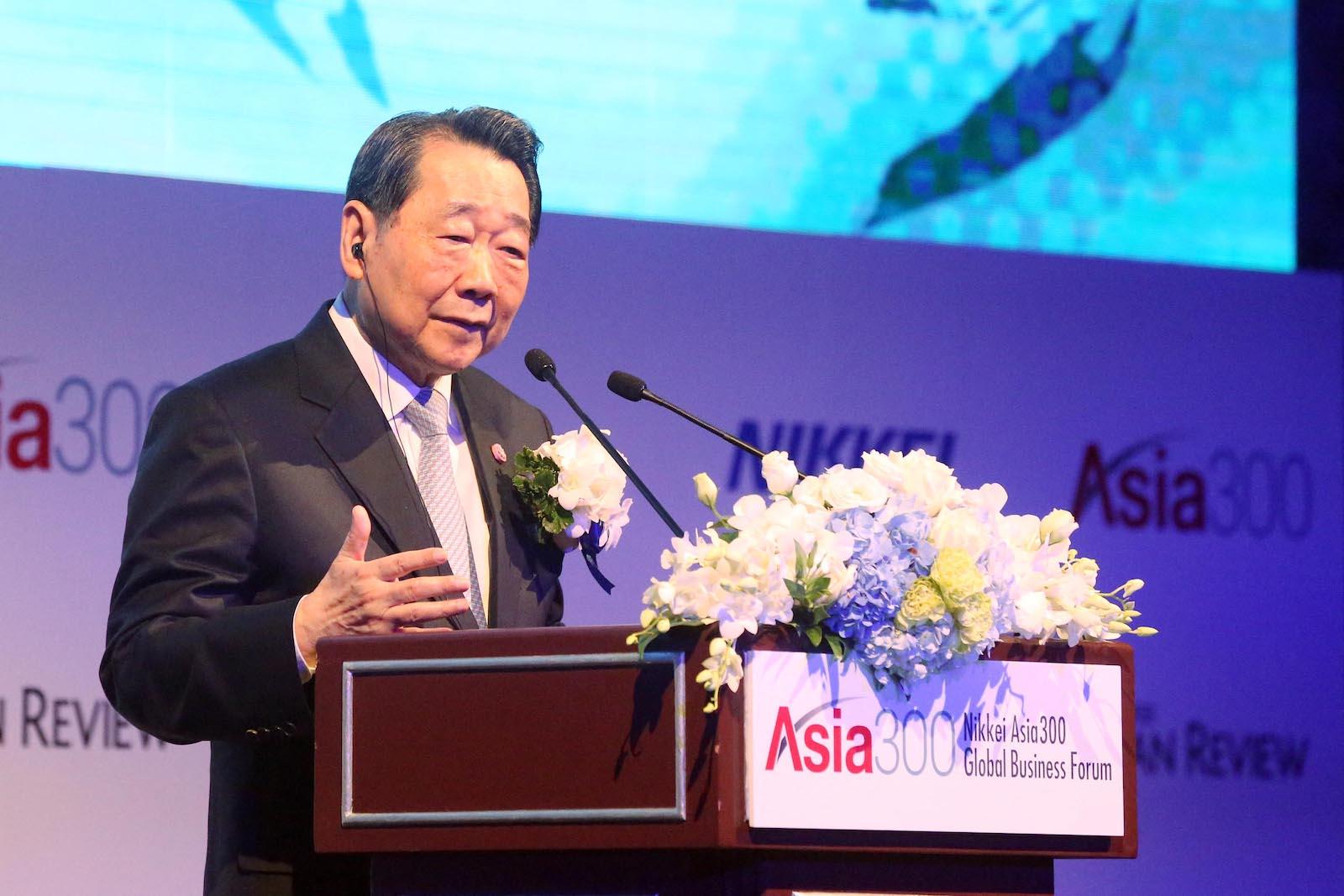
CP Group chairman Dhanin Chearavanont is among Thailand's richest businessmen. Photo: Post Today via AFP / Weerawong Wongpreedee
Thailand's 50 richest businessmen added $28 billion to their cumulative wealth over the 15 months ending in March 2021, according to the last annual update by Forbes magazine, which placed their total wealth at $160 billion.
Many of these billionaires lead Thailand-based multinationals that have invested heavily overseas in recent years, particularly in faster-growing economies such as Vietnam and Indonesia.
“There is a significant outflow of FDI by Thai multinationals which are investing abroad,” said Kiatipong Ariyapruehya, a World Bank senior economist based in Thailand.
The World Bank estimates that private investment in Thailand will grow 1.1% in 2021 and 1.6% in 2022.
Private investment in the kingdom has been flaccid for years, and in the post-Covid era will face deep structural challenges such as a fast-aging society, an education system that perpetually failed to produce the skilled labor needed to move into higher-value-added industries and a government wary of adopting painful reforms.
That includes tax reform, something the Finance Ministry says it is preparing for post-Covid. Thailand's revenue-to-GDP ratio was 15% in 2020, low by world standards. Revenue collection will be reduced during 2021-2022 by the need to provide rebates and defer tax payments to boost local liquidity.
But in the future, when Covid-19 relief measures peter out and future governments face the challenge of lowering public debt and the budget deficit, higher taxes will be fiscally inevitable.
“We have not yet officially unveiled the plan for the comprehensive overhaul of the tax regime because it is quite sensitive,” said the Ministry of Finance's Kulaya.“For now we are facing risks all around us, resulting in increased expenses for the government while tax collection has fallen short of our target.”
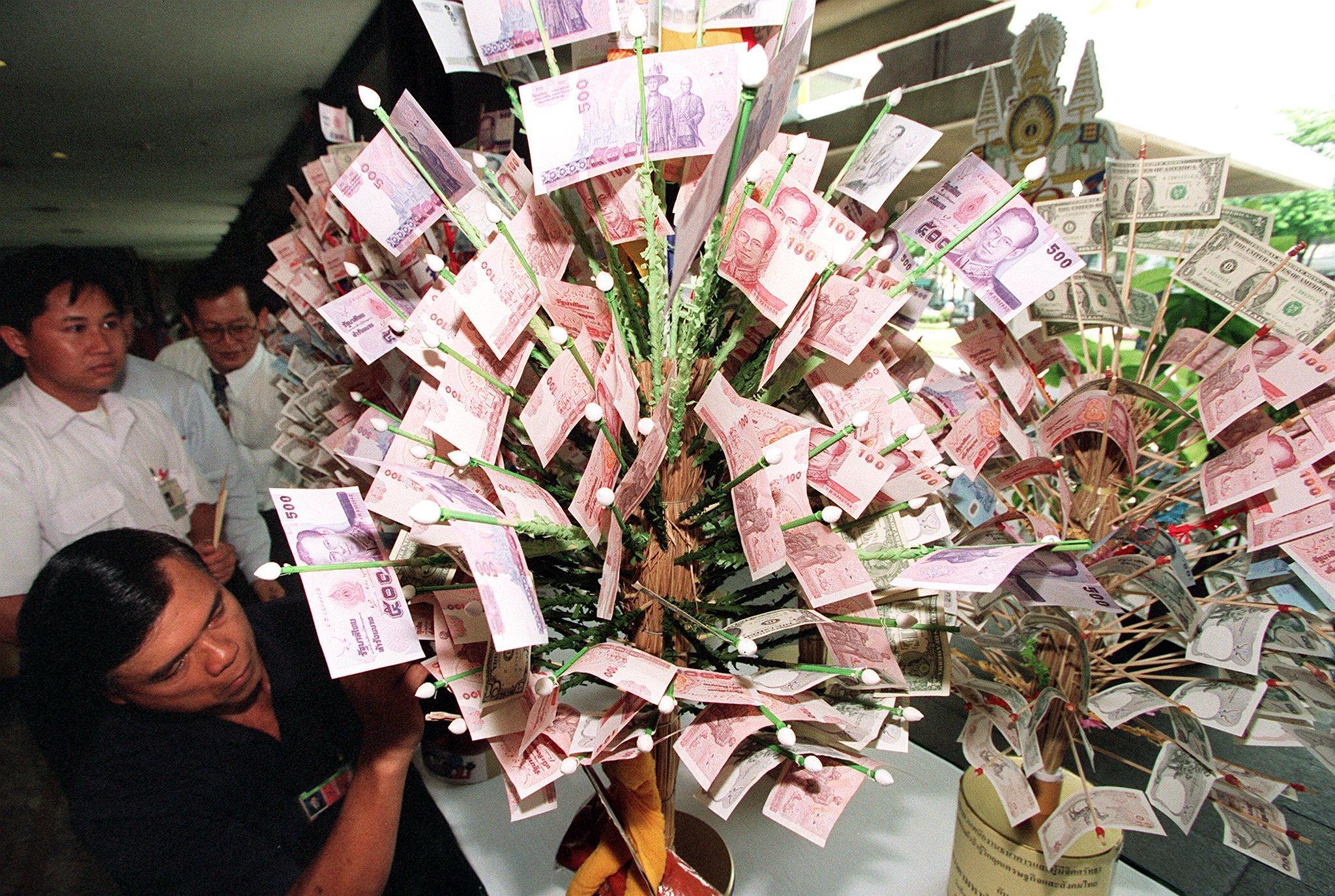
Bank of Thailand (BoT) officials arrange Thai baht bills onto ceremonious money trees in a file photo. Photo: AFP/ Pornchai Wittikongsakul
One option they might consider is upping taxes on the superrich.
“I think one of the report's findings is that there is scope to potentially levy additional taxes on high-net-worth individuals through various channels,” said Kim Edwards, another World Bank economist and co-author of its latest Thailand report.
“This would not only increase revenues but also enhance the progressivity of the tax system and therefore help mitigate inequality,” he said.
MENAFN20072021000159011032ID1102483023